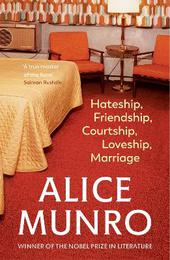
|
Hateship, Friendship, Courtship, Loveship, Marriage
Paperback / softback
Main Details
| Title |
Hateship, Friendship, Courtship, Loveship, Marriage
|
| Authors and Contributors |
By (author) Alice Munro
|
| Physical Properties |
| Format:Paperback / softback | | Pages:336 | | Dimensions(mm): Height 200,Width 130 |
|
| Category/Genre | Modern and contemporary fiction (post c 1945)
Short stories |
|---|
| ISBN/Barcode |
9780099422747
|
| Classifications | Dewey:813.54 |
|---|
| Audience | |
|---|
|
Publishing Details |
| Publisher |
Vintage Publishing
|
| Imprint |
Vintage
|
| Publication Date |
1 August 2002 |
| Publication Country |
United Kingdom
|
Description
2021 sees all of Alice Munro's backlist reissued in a new, modern look. These editions will appeal to a broad range of literary readers WINNER OF THE NOBEL PRIZE IN LITERATURE In these stories lives come into focus through single events or sudden memories which bring the past bubbling to the surface. The past, as Alice Munro's characters discover, is made up not only of what is remembered, but also what isn't. The past is there, just out of the picture, but if memories haven't been savoured, recalled in the mind and boxed away, it's as if they have never been - until a moment when the pieces of the jigsaw re-form suddenly, sometimes pleasurably but more often painfully. Women look back at their young selves, at first marriages made when they were naive and trusting, at husbands and their difficult, demanding little ways. There is in this new collection an underlying heartbreak, a sense of regret in her characters for what might have been, for a fork in the road not taken, a memory suppressed in an act of prudent emotional housekeeping. But at the same time there is hope, there are second chances - here are people who reinvent themselves, seize life by the throat, who have moved on and can dare to conjure up the hidden memories, daring to go beyond what is remembered.
Author Biography
**Winner of the Nobel Prize in Literature** Alice Munro was born in 1931 and is the author of thirteen collections of stories, most recently Dear Life, and a novel, Lives of Girls and Women. She has received many awards and prizes, including three of Canada's Governor General's Literary Awards and two Giller Prizes, the Rea Award for the Short Story, the Lannan Literary Award, the WHSmith Book Award in the UK, the National Book Critics Circle Award in the US, was shortlisted for the Booker Prize for The Beggar Maid, and has been awarded the Man Booker International Prize 2009 for her overall contribution to fiction on the world stage, and in 2013 she won the Nobel Prize in Literature. Her stories have appeared in the New Yorker, Atlantic Monthly, Paris Review and other publications, and her collections have been translated into thirteen languages. She lives with her husband in Clinton, Ontario, near Lake Huron in Canada.
Reviews"Another breathtaking demonstration of her mastery of the short story... No one could possibly dispute Munro's greatness; the genius of her seamless, unmatchable prose which nets up the flow of everyday life so miraculously" Daily Mail "Munro gives each of her stories the rich density of a compacted novel...The distinctive vitality of her stories come from their imaginative limberness...triumphantly displays impressive feats of flexibility, always gracefully adapted to life's twists and turns" Sunday Times "Munro is an artist of the domestic interior... She stands at an angle to the mass of her contemporaries set aside both by the beauty of her prose and by the calm intensity of her engagement with her material" Evening Standard "The nine stories in this collection have the kind of spaciousness, the attention to detail, that one expects from lengthier fiction... There is a core of mystery in every Munro story, and that is why re-reading them is such a continuous pleasure" Independent "Each of her tales contains the depth and scope of a novel...these melancholy, autumnal tales of small-town Canadian life demonstrate the gentle power of the short story at its best" New Statesman
|